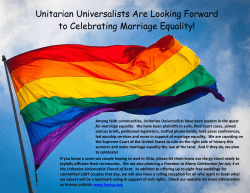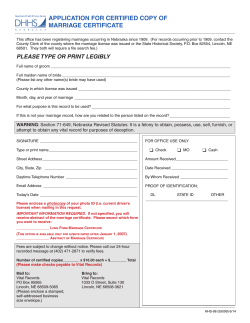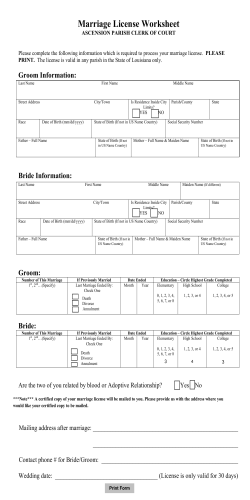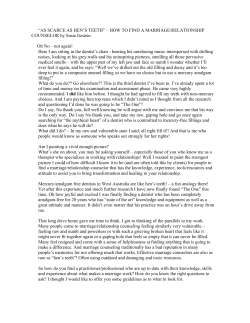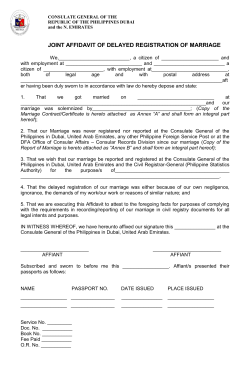
RIWI ILGA report.indd
ATTITUDES TOWARDS MARRIAGE EQUALITY IN 51 COUNTRIES Results of a survey conducted by the RIWI Corporation and presented with ILGA on the occasion of the International Day Against Homophobia and Transphobia Geneva, 13 May 2015 The International Lesbian, Gay, Bisexual, Trans and Intesex Association (ILGA) and the RIWI Corporation (RIWI) collaborated to release the results of a global survey for this report. The survey was conducted using RIWI’s patented Random Domain Intercept Technology (RDIT™) which asked the question, “Should same-sex marriage be legal?” The objective of the survey was to use the data to gauge public opinion in relation to current social issues towards LGBTI people from around the world. The results reflect a significant portion of the global public opinion, since densely populated countries such as China and India were included in the survey. The study was conducted from April 18th to June 20th, 2014 and gathered responses from 51,700 Web users in 51 countries. This question was part of the RIWI Global Index, which is an ongoing study conducted by RIWI on various social issues. The study includes partners such as the World Bank and the International Foundation for Electoral Systems and is meant to measure public awareness, promote social campaigns, and capture citizen opinions globally. ILGA’s top priorities remain the universal decriminalization of same-sex sexual activities among consenting adults and the universal depathologisation of trans and intersex persons. While marriage equality is not one of the top priorities for ILGA, there is no doubt that a survey exploring the acceptance of same-sex marriage is a useful indicator as to the general acceptance of LGBTI people by the societies they live in. The result of the survey show that in countries1 which already have marriage equality or are very close to having it (Ireland, USA, and Mexico), the population is overwhelmingly in favour of the same-sex marriage, with two important exceptions: Canada UK New Zealand Argentina Spain France Portugal Ireland* Mexico* United States* South Africa Yes 53% 49% 55% 49% 58% 38% 49% 52% 47% 45% 31% No 29% 30% 31% 34% 22% 37% 25% 29% 32% 33% 50% Don’t Know 19% 21% 14% 17% 21% 25% 26% 19% 21% 22% 19% Key: yes: more than 50% yes: less than 50% yes - no: < 4% no: less than 50% no: more than 50% In France those in favour and those against marriage equality almost balance each other out (38% in favour v 37% against), a result which reminds us of how hard the legislative battle for this institution was fought, where opposition to marriage equality manifested itself through harsh protests. In South Africa those against marriage equality are a clear (albeit silent?) majority, this is a puzzling result, considering that South Africa has been the fourth country in the world, after the Netherlands (2001), Spain and Canada (2005), to open marriage to same-sex couples. Countries2 which have institutions similar to marriage equality, like civil partnerships, or institutions with considerably less rights than marriage equality (i.e. Israel and Australia) or whose parliaments which are about to discuss civil partnership bills (i.e. Italy), show contrasting results: 1 Marriage open for same-sex couples (16 States): South Africa (2006), Belgium (2003), Denmark (2012), France (2013), Iceland (2010), Luxembourg (2015), Netherlands (2001), Norway (2009), Portugal (2010), Slovenia (2015), Spain (2005), Sweden (2009), United Kingdom (2014) (most parts), Argentina (2010), some parts of Mexico, Uruguay (2013), Canada (2005), United States (most parts), New Zealand (2013). 2 Same-sex couples offered all or most rights attached to marriage, but not marriage itself (Civil Partnerships, Registered Partnerships, Civil Unions, etc.) (12 States): Austria (2010), Croatia (2014), Germany (2001), Hungary (2009), Ireland (2011), Liechtenstein (2011), Malta (2014), Switzerland (2007), Brazil (2011/2013), Chile (2015), Colombia (2009), Ecuador (2014), and some parts of Mexico (2007), some parts of Australia. Some recognition of same-sex relationships in law, without most rights attached to marriage (5 States): Israel (1994), Andorra (2005), Czech Republic (2006), Slovenia (2006), Costa Rica (2013), some parts of the United States, some parts of Australia. 2 Attitudes Towards Marriage Equality in 51 Countries Chile Colombia Ecuador Austria Brazil Switzerland Germany Israel Australia Italy Yes 36% 34% 25% 52% 37% 48% 51% 39% 48% 42% No 44% 47% 56% 32% 41% 30% 29% 41% 32% 38% Don’t Know 19% 19% 19% 16% 22% 22% 20% 20% 20% 20% In Chile, Colombia, and Ecuador, which have civil partnership laws, the majority of the populations seem clearly against same-sex marriage, whereas in Brazil, Israel, and Italy those in favour and those against are very close (37% for v 41% against in Brazil, 39% for v 41% against in Israel, 42% for v 38% against in Italy). This result explains these three governments’ adoptions or plans to adopt civil partnerships and unwillingness to move further for the time being. In Austria, Australia, Germany, and Switzerland people are significantly more in support than against marriage equality. When moving towards countries which have no current plans of adopting legislation affecting same-sex couples, we can see how in most of them the majority is against equality marriage: China Indonesia Japan South Korea Philippines Dominican Republic Guatemala Peru Venezuela Yes 38% 14% 28% 32% 25% 13% 28% 27% 23% 29% 28% No 34% 73% 30% 36% 54% 66% 49% 55% 61% 53% 51% Don’t Know 27% 12% 42% 31% 21% 21% 23% 18% 17% 17% 21% Poland Ukraine Interestingly, however, in the case of three countries, i.e. China, Japan, and South Korea, the distance between those in favour and those against is equal to or less than 4%, with China having slightly more in favour of equality marriage. In countries with legislation criminalizing individuals on the basis of their sexual orientation, or in countries where LGBTI activists can be prosecuted on the basis of so-called “anti gay-propaganda” laws (e.g. Russia), the results show populations clearly against the idea of opening marriage to samesex couples: Russia UAE Algeria Egypt Morocco Saudi Arabia Sudan Syria Tunisia Yes 11% 24% 28% 28% 31% 26% 29% 21% 18% No 73% 55% 39% 41% 46% 46% 43% 56% 62% Don’t Know 16% 20% 33% 31% 23% 29% 29% 24% 21% Ghana India Jamaica Kenya Malaysia Nigeria Pakistan Trinidad and Tobago Yes 12% 33% 13% 27% 28% 18% 32% 31% No 76% 44% 64% 64% 45% 69% 53% 52% Don’t Know 12% 23% 23% 9% 27% 13% 14% 17% It is interesting to note that the degree of opposition to equality marriage differs considerably between one country and another. Russia and Ukraine, for instance, show a higher percentage against same-sex marriage than Egypt and Saudi Arabia, despite the four countries belonging to the same group where internet accessibility is between 40 and 60% of the population (hence the data of the two Middle East countries cannot simply be justified by being representative of a more ‘sophisticated’ part of the population, see http://upload.wikimedia.org/wikipedia/ commons/9/99/InternetPenetrationWorldMap.svg ). The results of this survey, in as far they can allow also to gauge the general acceptance by a population vis-à-vis minorities characterized by non-normative sexual orientations or gender identities/expressions, may not come as a surprise to the many LGBTI activists all over the Attitudes Towards Marriage Equality in 51 Countries 3 world, but do provide additional insight to the question as to whether it is the laws that change perceptions in the population or if laws emerge only once population perception has already changes in relation to certain minorities. These are complex issues and more research is needed. Both RIWI and ILGA are seeking partners interested in future studies covering a greater range of issues related to perceptions of sexual orientation and gender identity. This research will be conducted at the global and regional levels, to identify factors conditioning social attitudes towards LGBTI people in society around the world. Methodology Random Domain Intercept Technology (RDIT) is the only technology capable of randomly intercepting Web users in every country and territory in the world across on Web-enabled devices. When a Web user is looking for a website, they may type in an address into the URL bar that takes them to an unintended destination. The intended destination either doesn’t exist or is inaccurate, but instead of seeing an error page, the Web user can randomly encounter a RIWI survey on that page, which RIWI controls at that given time. RDIT accesses this dynamic and highly scalable flow of online users around the world every day. For more information contact: Renato Sabbadini, Executive Director, ILGA [email protected] +41227313254 Eric Meerkamper, President, RIWI Corporation [email protected] +1-416-205-9984 About ILGA About The RIWI Corporation The International Lesbian, Gay, Bisexual, Trans and Intersex Association, is the world federation of national and local organizations dedicated to achieving equal rights for lesbian, gay, bisexual, trans and intersex (LGBTI) people. ILGA is an umbrella organization of more than 1100 member organizations across the world. ILGA’s aim is to work for the equality of lesbian, gay, bisxexual, trans, and intersex people and their liberation from all forms of discrimination. The RIWI Corporation (RIWI) is a global data capture company whose Random Domain Intercept Technology (RDIT™) is the only all-device technology capable of randomly intercepting online survey respondents in every country and territory in the world. A full description of the RDIT methodology can be found at: www.riwi.com. 4 Attitudes Towards Marriage Equality in 51 Countries
© Copyright 2026
